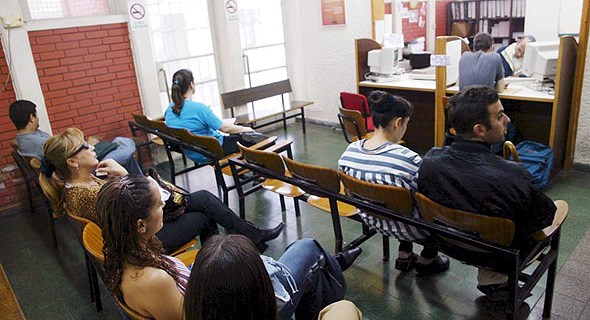Outraged Owners Protest As Coronavirus Crisis Cripples Small Businesses
Rallies held in Jerusalem, Tel Aviv and Haifa as protesters claim only 1,900 of 41,000 requests for loans made by small- and medium-sized businesses have been approved to date
18:0620.04.20
Small business owners and self-employed workers in Israel let their outrage show on Sunday, holding protests outside the parliament building and president's residence in Jerusalem. Additional rallies were held in Tel Aviv and Haifa, with protesters angry with what they claim, is insufficient financial assistance from the government. According to the protesters, only 1,900 of 41,000 requests for loans made by small- and medium-sized businesses have been approved.
 Employment office in Tel Aviv. Photo: Tzvika Tishler
Employment office in Tel Aviv. Photo: Tzvika Tishler
President Reuven Rivlin invited two demonstrators into his residence and promised to help. “I heard the protest of the self-employed outside Beit HaNasi and invited its leaders to come and talk,” Rivlin tweeted. “This is an emergency and I promised them, and all self-employed people, that policy-makers will hear what they say. We need to see the big picture without abandoning anyone.”
 Employment office in Tel Aviv. Photo: Tzvika Tishler
Employment office in Tel Aviv. Photo: Tzvika Tishler The number of people diagnosed with Covid-19 currently stands at 13,654, with the number of seriously ill dropping to 150 and the number of patients requiring respirators remaining steady at 113. The number of dead totals 173. Some 3,872 Israelis have recovered from the virus. The number of recoveries has now exceeded the number of new diagnoses for the fourth day in a row.
According to the Ministry of Health, there are currently 547 coronavirus patients receiving treatment in hospitals while 6,710 people are fighting the virus at home. Another 2,166 people are currently receiving treatment in specially designated hotels and 17 are awaiting a decision on whether they will be treated.
The Israeli government approved early Sunday a series of rollbacks to restrictions put in place to prevent the spread of coronavirus in light of a statistical improvement in the number of sick and infected. Starting Sunday, there will be an easing of restrictions on the number of employees allowed to work from the office (subject to prevention measures), some stores will be allowed to re-open, public prayer services will resume under strict social distancing practices and groups of up to two people are allowed to work out together.
Deputy Director-General of the Ministry of Health, Itamar Grotto, said Monday he believes restrictions have been eased too soon and predicted a spike in new cases. "The number of confirmed cases has been on the decline and the restrictions that were in place were working," Grotto told Ynet. "It is up to the government to decide if it is willing to risk a rise in the number of infections. The public's behavior is key and rather than imposing restrictions on the whole country we can perhaps be more surgical in our actions. I think we have the tools necessary to do so with intelligence gathering and enforcement at our disposal. The government must decide how much of a risk it is willing to take, how many more people will need ventilators or even die."



